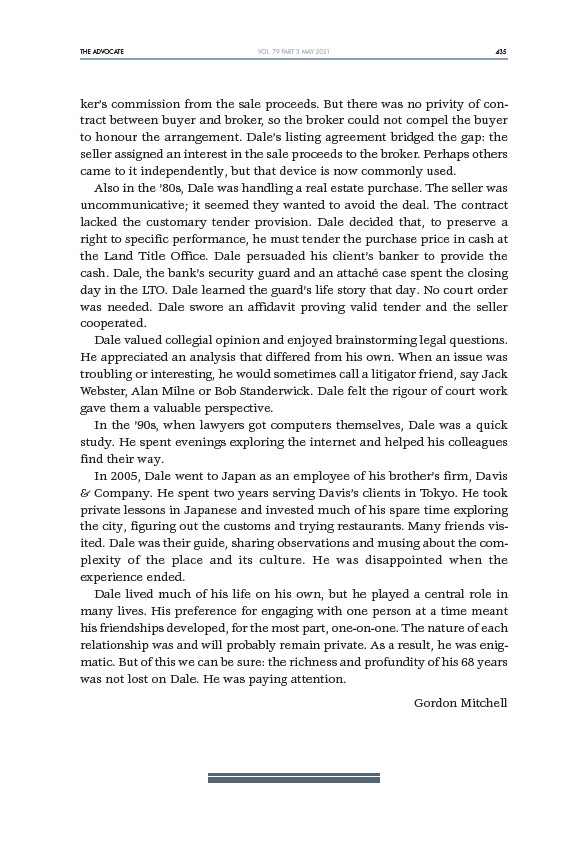
THE ADVOCATE 435
VOL. 79 PART 3 MAY 2021
ker’s commission from the sale proceeds. But there was no privity of contract
between buyer and broker, so the broker could not compel the buyer
to honour the arrangement. Dale’s listing agreement bridged the gap: the
seller assigned an interest in the sale proceeds to the broker. Perhaps others
came to it independently, but that device is now commonly used.
Also in the ’80s, Dale was handling a real estate purchase. The seller was
uncommunicative; it seemed they wanted to avoid the deal. The contract
lacked the customary tender provision. Dale decided that, to preserve a
right to specific performance, he must tender the purchase price in cash at
the Land Title Office. Dale persuaded his client’s banker to provide the
cash. Dale, the bank’s security guard and an attaché case spent the closing
day in the LTO. Dale learned the guard’s life story that day. No court order
was needed. Dale swore an affidavit proving valid tender and the seller
cooperated.
Dale valued collegial opinion and enjoyed brainstorming legal questions.
He appreciated an analysis that differed from his own. When an issue was
troubling or interesting, he would sometimes call a litigator friend, say Jack
Webster, Alan Milne or Bob Standerwick. Dale felt the rigour of court work
gave them a valuable perspective.
In the ’90s, when lawyers got computers themselves, Dale was a quick
study. He spent evenings exploring the internet and helped his colleagues
find their way.
In 2005, Dale went to Japan as an employee of his brother’s firm, Davis
& Company. He spent two years serving Davis’s clients in Tokyo. He took
private lessons in Japanese and invested much of his spare time exploring
the city, figuring out the customs and trying restaurants. Many friends visited.
Dale was their guide, sharing observations and musing about the complexity
of the place and its culture. He was disappointed when the
experience ended.
Dale lived much of his life on his own, but he played a central role in
many lives. His preference for engaging with one person at a time meant
his friendships developed, for the most part, one-on-one. The nature of each
relationship was and will probably remain private. As a result, he was enigmatic.
But of this we can be sure: the richness and profundity of his 68 years
was not lost on Dale. He was paying attention.
Gordon Mitchell